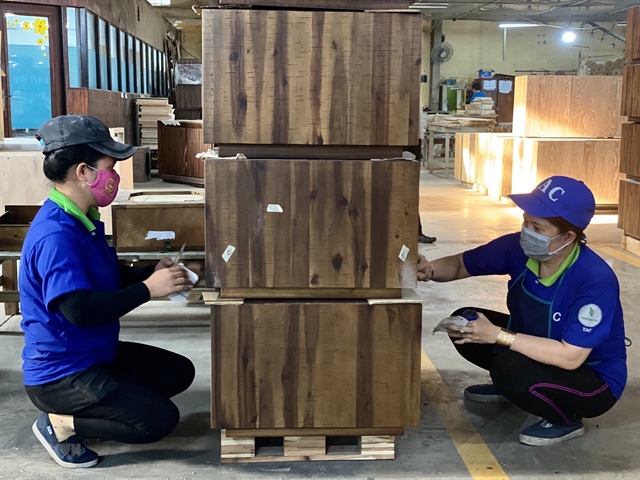Experts urged wood exporters to diversify markets, standardise supply chains and be well equipped with trade defense knowledge in the face of increasing trade protectionism.

Experts have urged wood exporters to diversify markets, standardise supply chains and be well equipped with trade defence knowledge in the face of increasing trade protectionism.
According to the Viet Nam Administration of Forestry, the stronger the wood export, the higher the risk the wood industry faced with trade defence lawsuits.
Ngo Sy Hoai, Deputy President of the Viet Nam Timber and Forest Product Association, said that the wood export of Viet Nam increased sharply in recent years.
Viet Nam was currently the fifth largest wood exporter in the world, Hoai said, adding that together with the trend of trade liberalisation with several free trade agreements (FTAs) Viet Nam signed, other countries were increasing trade defence measures with Viet Nam.
Viet Nam Administration of Forest statistics show that the export of timber and forestry products was estimated at US$S10.4 billion in the first seven months of the year. Last year, wood exports set a record of $16 billion, representing a rise of 20 per cent against 2020.
Besides the imposition of anti-dumping and anti-subsidy duties, Viet Nam faced other risks, including US investigations into illegal logging and timber trading.
Nguyen Thi Thu Trang, Director of the WTO and Integration Centre under the Viet Nam Chamber of Commerce and Industry, said that the US was the market where Vietnamese products faced a high risk of trade lawsuits, citing statistics that the US initiated 1,159 out of 7,528 trade remedy investigations globally in 1995-2021.
However, enterprises were not well prepared in terms of knowledge about trade remedies and resources to deal with investigations.
Not only wood but other products with significant increases in exports were exposed to the risk of trade remedy investigations.
The trend for investigation was becoming increasingly intensive and rigorous, Chu Thang Trung, Deputy Director of the Ministry of Industry and Trade Remedies Authority of Viet Nam, said.
Trung said that the FTAs opened up large opportunities for Vietnamese products to expand in foreign markets and increase production capacity. On the other hand, Vietnamese products were faced with the increased risk of investigation and trade remedies.
He cited statistics that Vietnamese export products were the subject of 220 cases of trade defence investigation by the end of July.
Trung said that trade defence was an inevitable trend of the integration process. This also demonstrated that the production and export capacity of the Vietnamese economy was developing and competitive enough to put pressure on the domestic industries of the importing countries, forcing the application of trade remedies to protect domestic industries, he said.
Trung said that enterprises should diversify markets to disperse risks.
He said it was also important that enterprises strictly abide by the laws in production and business and not participate in acts of origin fraud or illegal transhipment. If fraud or illegal transhipment were detected, the importing country could apply heavy sanctions and, in many cases, enterprises could lose their markets, he said.
Trung added that enterprises should also focus on developing the domestic production chain and the origin traceability system, which was a sustainable development direction to reduce the risk of being investigated. — VNS





